 Petzlover
PetzloverGrand Griffon Vendeen is originated from France but North Country Beagle is originated from United Kingdom. Both Grand Griffon Vendeen and North Country Beagle are of same height. Grand Griffon Vendeen may weigh 9 kg / 20 pounds more than North Country Beagle. Both Grand Griffon Vendeen and North Country Beagle has same life span. Grand Griffon Vendeen may have more litter size than North Country Beagle. Grand Griffon Vendeen requires Moderate Maintenance. But North Country Beagle requires Low Maintenance
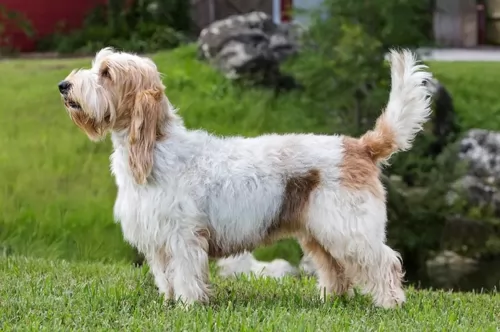 The Grand Basset Griffon Vendeen is a French scenthound that has changed over many centuries. Today the area in France where they originate from, has contributed to the dog's looks.
The Grand Basset Griffon Vendeen is a French scenthound that has changed over many centuries. Today the area in France where they originate from, has contributed to the dog's looks.
The rocky and thorny region of Vendeé required a hardy breed of dog. Also, hunters wanted a slower hound that they could keep up with and the idea was to shorten the legs of the dog.
By the end of the 19th century, the Basset Griffon Vendéen was developed. By the 1950s, the Grand was considered a separate breed.Today the dog is a long-backed and short-legged hunting dog.
Known also as the Northern Hound or the Northern Beagle, the North Country Beagle hailed from Britain and is extinct.
It hailed more specifically from- and was native to the Yorkshire and Northumberland regions of England. As a scenthound it was known for its hunting skills.
There isn’t much known about the dog but it is one of England’s oldest hound breeds, with much of its ancestry been lost. There are many theories surrounding the origins of this dog. Also, the date at which the North Country Beagle was developed is also debatable but it has always been a good hunter.
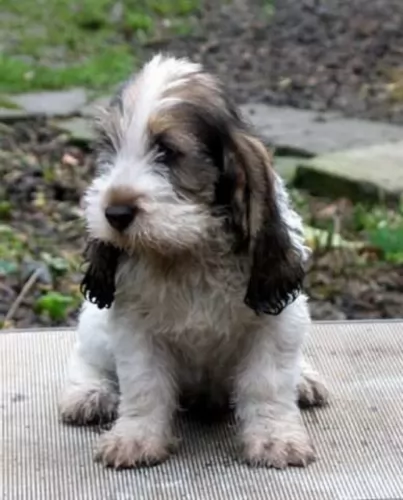 Kept today essentially as a domestic pet, the Grand Basset Griffon Vendéen is a strongly built dog, a rough-coated scent hound of medium size standing at roughly 39 to 45cm in height and weighing 18 to 20kg.
Kept today essentially as a domestic pet, the Grand Basset Griffon Vendéen is a strongly built dog, a rough-coated scent hound of medium size standing at roughly 39 to 45cm in height and weighing 18 to 20kg.
The coat is medium length, shaggy and wiry. It is essentially white with orange markings. Sometimes he can be tri-colored, having a combination of orange, black or tan markings. The double coat is actually regarded as his defining characteristic, being shaggy with a wiry texture that sets him apart from other hound breeds.
His legs are straight, and he is longer than he is tall. He is a deep chested dog with long ears and a long tail. He is also noted for his mustache and beard with long eyebrows.
Your Grand Basset is a courageous, happy, confident dog. He is active and has great stamina. As a social, pack dog, he likes plenty of time spent with his owner, failing which the owner should invest in another dog too so as to be part of a pack. He will get on great with children and he is also a pet-friendly breed who will get on well with cats too. He is sharp and alert and responds well to training and socialization.
The North Country Beagle seemed to vary quite a bit in size and because there isn’t much information on this extinct dog, we can assume he was much the same size of the Beagle we know today which is roughly 33 – 45cm in height and weighing between 9 and 11kg.
Not much is known about the dog’s appearance but it is believed that it looked much like the Southern Hound and English Foxhound. It was likely a medium sized dog with longish ears, thick bones but always agile and athletic.
There is very little known on what this dog’s temperament was like. He was strong willed and if you owned such a dog you would have had to have him trained and socialized. It was a dog that showed very little signs of aggression. It seemed the dog was friendly, social and loving to his human family.
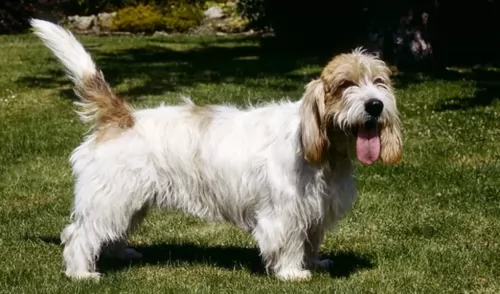 This long-backed, short legged hunting dog has a happy, confident personality. While he was used originally for hunting, he is now commonly kept as a companion.
This long-backed, short legged hunting dog has a happy, confident personality. While he was used originally for hunting, he is now commonly kept as a companion.
He is energetic and independent and will require you having him join you for walks and a ball game too.
Non-aggressive and adaptable he can live in the city or in the countryside so long as he receives plenty of attention and love – then he'll be a splendid pet.
The North Country Beagle was a social, energetic dog who loved spending time with his human family. They were intelligent too, so training and socialization were possibly easy for him.
They weren't regarded as raucous kind of dogs and were fairly quiet. They were quite social and didn't like being left alone for too long. They were adaptable too, slotting quite easily into country- or city life.
Coolish with strangers, the North Country Beagle made a good pet and companion with a generally happy, contented disposition.
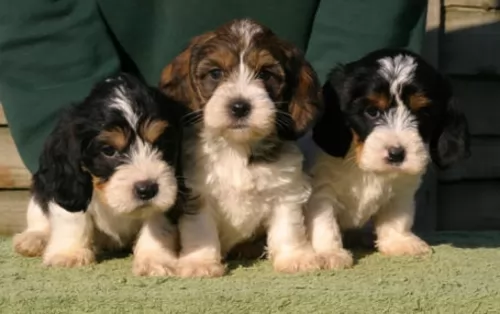 There are some Basset Griffon Vendéens that have reached 17 years of age. This is excellent for these dogs, and lifestyle, nutrition and exercise can all play a part in the longevity of any dog. While he is a pretty robust canine, you'll want to be aware of some of the diseases which may require veterinary intervention.
There are some Basset Griffon Vendéens that have reached 17 years of age. This is excellent for these dogs, and lifestyle, nutrition and exercise can all play a part in the longevity of any dog. While he is a pretty robust canine, you'll want to be aware of some of the diseases which may require veterinary intervention.
Cancer is a major cause of death in elderly dogs, but if caught early, the dog can be cured. These cancers can be malignant lymphoma, skin cancer, bone cancer or soft tissue sarcomas. You'll notice a lump on your pet or a wound that won't heal. When you notice your dog not feeling well, get him to the vet.
Common forms of heart disease in dogs is valvular disease, heart-worm disease and myocardial disease. The signs of heart disease in your pet will depend on the severity of the disease and type.
As heart disease moves on to congestive heart failure, you'll notice symptoms such as difficulty with breathing, fatigue, loss of appetite and weight loss. You need to get your dog immediately to the vet.
Dog allergies can be caused by pollen, medications, food or insects. Your pet will be scratching, he'll have watery eyes and inflamed skin. This inflammatory condition can cause a lot of agony for your pet, driving him mad with the itch and pain. Relieve his discomfort by getting him to the vet as soon as possible.
The North Country Beagle had a lifespan of 12 to 15 years, and while he was a fairly healthy dog breed, there were some common health issues to look out for. Some of these were patellar luxation, epilepsy and glaucoma.
This is a condition where there is pressure in the eye and where there is inadequate fluid drainage as well. Left untreated, it can lead to permanent damage to the optic nerve which can lead to blindness.
It is fairly common in certain breeds. There is primary and secondary glaucoma and symptoms for instance with primary glaucoma can be this high pressure within the eye and also a cloudy appearance in front of the eye along with redness of the blood vessels and dilated pupils. There can also be headaches and loss of appetite.
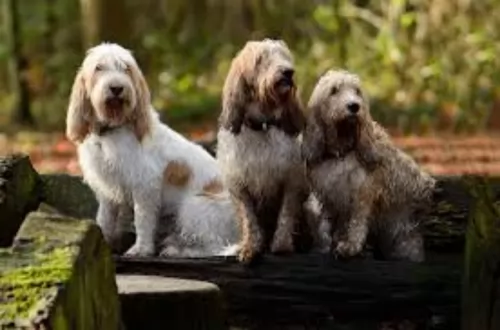 If you are going to be feeding your Grand Basset Griffon Vendéen kibble, there are manufacturers who bring out excellent foods which are breed-specific formulas for age, size and energy levels of dogs.
If you are going to be feeding your Grand Basset Griffon Vendéen kibble, there are manufacturers who bring out excellent foods which are breed-specific formulas for age, size and energy levels of dogs.
Feeding a dog is an individual choice, but good food can increase his longevity. A bit of raw meat mixed into his kibble, or some cooked brown rice, vegetables and chicken will be excellent for him and can add some tasty variety to his diet.
Fresh, cool water must always be available at all times.
The Grand Basset Griffon Vendeen’s coat is double and the rough, harsh coat will need brushing twice a week and stripped once a year.
Your North Country Beagle was a social animal and he always had a whole lot of love and friendship to offer his human family.
Today, if you bring such a dog into your home, its your responsibility to care for him and provide him with love.
A puppy such as this would have been fed 4 times a day. As he got older he would have had his meals cut down to one or two a day. His owners would have chosen a dog food according to age and activity levels, but always made sure that the food was rich in vitamins and minerals.
Dry kibble has the advantage of keeping your dogs teeth clean. Home-made food was and is always a welcome treat and can occasionally be added to the dry kibble. Keep the food consistent and simple to avoid stomach upsets.
Boiled chicken, brown rice or pasta and some cooked vegetables such as carrots, sweet potato and spinach would have kept the Beagle happy and healthy and is an excellent diet today for modern dogs. Sometimes you can also give a little bit of raw meat. Never leave any dog without a constant supply of fresh, cool water.
Your North Country Beagle would have required lots of energy and will have required being exercised. His owners may have taken him for walks every day, and modern Beagles today would require ball games and games that also provide him with the chance to think and work things out.
If you bring a pet home such as what the North Country Beagle was like, as a puppy, you would have had to make a vet appointment to ensure he had his vaccinations to protect him from deadly diseases.
General grooming of your North Country Beagle would have required you brushing him twice a week, checking inside and outside his ears for infection. This is particularly of importance with floppy eared dogs like this. Check his eyes and teeth too. His nails couldn't be neglected either, as left long, they could have hooked onto objects, tearing and causing pain and bleeding.